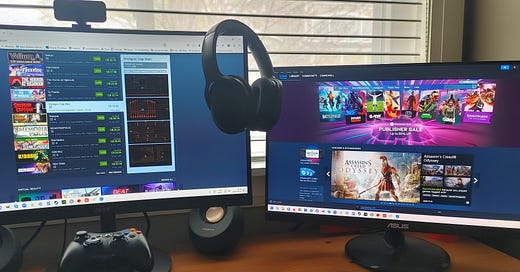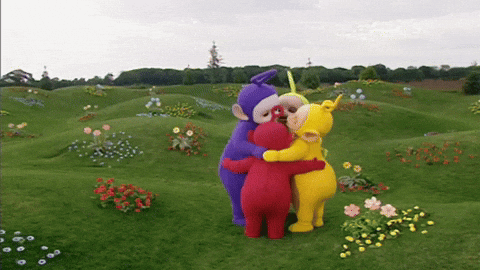How do we choose the video games to play?
Word of mouth and vibes, my friends, word of mouth and vibes.
Choosing a video game isn’t a high-stakes choice, but it can sure feel that way when I’m in between games. If it’s been a while since I played (gasp!), or if the game I’ve just finished was a heavy hitter, the choice of what to follow it up with can seem… weighty.
The concept of choice is fascinating to me. I find it liberating to realize that, despite my best attempts to the contrary, most decisions I make aren’t rational, at least not fully so. And neither are yours, my invisible friend.
Where gaming is concerned, that’s a good thing.
Gaming is entertainment. Emotions are central to it. You can experience the same game completely differently depending on your mood, on how tired you are, on what your friends on Bluesky said or didn’t say about it… You can hate playing something and then love it if you come back. Hey, it’s happened before! I hope it will happen to me when/if I re-attempt playing Red Dead Redemption II!
But choosing a game is a commitment. Maybe not such a huge one, but a commitment of time and money nonetheless. It’s scary to start something new. Loss aversion is strong in us humans—psychology 101 again!—so we worry, and worry, and worry more before committing to a purchase.
”What if I don’t like it?”, “What if it sucks?“, “What if the guy who said it was stupid was right?“, “Should I wait for a Steam sale?“
Just me?
You’d think with the wide array of games for any taste, catalogued and meticulously categorized, with screenshots, trailers, and genres defined, selecting a game would be a matter of browsing and filtering. A rational way, in other words. Not so.
I make game purchasing decisions impulsively. There, I admit it. They’re spur of the moment, but built up over time with a mix of recommendations, word of mouth, and a loose understanding of what kind of games I like, and maybe some influence of the Steam discovery queue, although that’s rare. The best way to describe it is vibes. It’s the smallest comments, the tiniest things that tip me over the edge.
Exhibit A: Hades. A friend told me she loves it because it’s kickass and the soundtrack is amazing.
Exhibit B: The Witcher games. Another friend, who doesn’t play video games AT ALL, mentioned in passing that the Witcher games have a cult following.
In both cases, nothing else was said. Literally, nothing. Yet onwards Katya goes, straight to the Steam store.
I love it so much, if I’m honest. I love the irrationality of it. I love discovering games that I would never have chosen by myself, and I love letting go in this way, taking a chance on something I never knew I could enjoy.
So many wonderful games I would never have experienced otherwise.
Word of mouth is similar, but like a recommendation from the hive mind. For me, it works with the biggest games that start with large audiences, so I have a chance to hear friends of friends rave about something. If the choir gets loud enough, I’ll eventually start paying attention. Most recently, this happened with Baldur’s Gate 3. It’s about to happen with Expedition 33: Clair Obscur.
Ah yes, there it is. The elephant in the room du jour.
As I’m writing this, I’m about to hit “Purchase“ on Expedition 33: Clair Obscur and download the game just in time for the weekend. I’m so, so excited to play it while millions of other players do too. We rarely get the enormous pleasure of shared experiences these days, and I don’t want to miss this cultural moment.
I’m certain I will love it. Yet I have some trepidation still. What if I can’t handle combat? What if it’s too hard? What if I can’t figure out dodging and parrying and fail completely at video games?
In other words, “What if the guy who said it was stupid was right?“
And so it goes with even the best of games.
To make the most out of word of mouth and vibes, the best thing is to make friends in the gaming community whose tastes and sensibilities I share, and whose “skill level” I can gauge. I’m putting “skills“ in quotation marks because it feels weird to bring up something that’s none of my business, but it helps knowing if we find the same or different things challenging.
I may be bad at soulslike combat, but I’m not afraid to cheese. Platforming might be hard, but I get better quickly with practice. I’ve got some godlike gamers on my feed, gentle cozy game lovers, and players somewhere in between, and I trust recommendations from all of them, just for different things.
Community 🧡
Choosing games to play is not that deep. But it can and does become deeply important for those of us who play a lot, especially now that the choices are seemingly endless and the time available to experience them is short.
How do you make those choices and decide what games to play next?







For me the choice is almost paralysing at times. I have an abundance of Steam games to put it mildly, enough where quite regularly I see something interesting in a blog or Reddit and on heading to the store page realise I already own it. My latest attempt at encouraging gameplay is a new organisation system I’m trying to implement so I can find those games I should be playing but simply haven’t got the time to sift through a mountain to find.
So yeah I see it as a high stakes choice and likely not to start any as a result. Happy to hear any thoughts on how you would tackle this!
"Choosing a video game isn’t a high-stakes choice, but it can sure feel that way when I’m in between games." Couldn't have said it better myself! The stakes feel even higher than usual these days and being strapped for cash really underscores the importance of good heuristics.
For me, that heuristic is something like "will this game stimulate my intellect and/or emotions?" The older I get, the less time I seem to have for the repetitive and the numbing, and the more excited I get by games (like Expedition 33!) that are clearly doing something special.
Hope I have room for Expedition 33 in the budget this month. But if not, no big deal — it'll go on sale sooner or later, and coming late to the party won't cheapen the experience one bit.